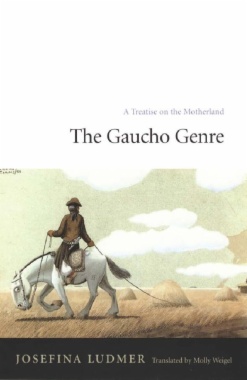Hailed when first published in Spanish in 1988 as one of the best contemporary examples of Latin American critical thought, Josefina Ludmer’s El género gauchesco describes the emergence of gaucho poetry—which uses the voice of the cowboy of the Argentine pampas for political purposes—as an urgent encounter of popular and elite tradition, of subaltern and hegemonic discourses. Molly Weigel’s translation captures the original's daringly innovative literary flavor, making available for the first time in English a book that opened a new arena in Latin American cultural history.
By examining the formation of a genre whose origins predated the consolidation of Argentina as a nation-state but that gained significance only after the country's independence, Ludmer elucidates the relationship of literature to the state, as well as the complex positionings of gender within the struggle for independence. She develops a sociological investigation of “outsider” culture through close textual analyses of works by Hidalgo, Ascasubi, Del Campo, Hernandez, Sarmiento, and Borges. This inquiry culminates in the assertion that language, marked as it is by the collisions of high and low culture, constitutes the central issue of Latin American modernization and modernism. Extensive annotation renders this edition of Ludmer's seminal study easily accessible for a North American audience.
The Gaucho Genre’s far-reaching implications will make it valuable reading for a varied audience. While teachers and students of Latin American literature and criticism will find it an important resource, it will also interest those concerned with the processes of nation-building or in the complex intersections of dominant and marginal voices.
- Contents
- Prologue to the second Spanish edition
- Acknowledgments: On the Side of the Gift
- 1. The Body of the Genre and Its Borders
- I. On the Side of Use
- The two chains
- Laws
- Wars
- Sarmiento and the words of exterior space: the heart of the historic space of the genre
- The word “gaucho” in the voice of the gaucho: the interior space. An exercise with the dictionary
- First outline of the genre
- The top and bottom margins of the genre: literary revolutions and two definitions of the gaucho as Argentine man
- Hidalgo’s transparency is the distribution of voices
- II. On the Side of the Master, on the Side of the Gift
- “A small preliminary cruise toward a reconnaissance of the Joyce archipelago” On the island: a study on montage
- 2. Challenge and Lament, the Intonations of the Motherland
- Inside the internal space of the genre
- Four definitions of the genre and its internal space
- And four formulas for the intonations
- The preludes or the code of the intonations
- The patriotic singer’s challenge
- Lament of the learned patriot
- The logic of the singer
- The challenges (on the side of use)
- The first fiesta of the monster
- Two more challenges with throat-cutting
- The challenges of the thug
- The laments (on the side of the gift)
- La ida, technical details and notes
- Intonations and codes in Borges
- The separation of intonations in Evaristo Carriego
- Borges before the law
- 3. In the Inferno’s Paradise
The Argentine Fausto
A Pastiche of Literary Criticism
- 4. Pact and Motherland
The Trickery of Hernández’s Professor’s Curandera
- The book of the pact
- Penitence in the margins: two incorrigibles
- A national language lesson and a game with institutions
- External inclusions
- Internal exclusions
- Who educates
- The word/voice (of ) “Picardía” and the literature of the future
- Index

